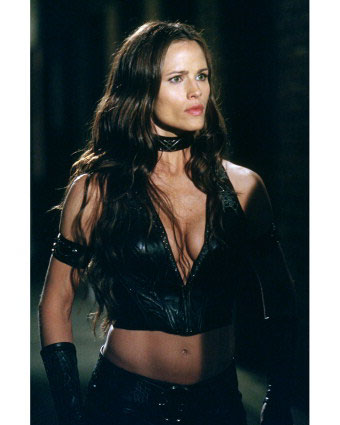Elektra:
The Good, the Bad, and the Beautiful
| Elektra (2005) Staring Jennifer Garner, Terence Stamp, and Kirsten Prout. Directed by Rob Bowman. Written by Zak Penn, Stu Zicherman, and Raven Metzner. |
Elektra is a sequel to the film Daredevil in a way. In another way, it's not.
When comic book legend Frank Miller wrote the Daredevil comic, he gave Daredevil a love-interest: Elektra, a beautiful assassin. Miller killed her off after a year or so, but she was so popular, Marvel made her the heroine of her own comic book.

|
| Garner as Elektra in Daredevil |
In the Daredevil film, they changed Elektra from cold-blooded assassin to innocent victim fighting back unsuccessfully. But they followed Miller's lead in killing her off. When film-makers couldn't get Ben Affleck or Colin Farrell to return for a sequel, they followed Marvel's lead and brought Jennifer Garner back as the no-longer-dead Elektra.
This time, they made Elektra more like the heartless assassin Frank Miller created. This film uses a different style and different look from Daredevil (it's more a samurai film than a comic book film), and it makes few references to Daredevil, making Elektra more of a stand-alone film than a sequel.
[Warning: the rest of this review is pure spoiler.]
Elektra is now hired to kill a man (Goran Visnjic) and his 13-year-old daughter (Kirsten Prout). The man is handsome and the girl reminds Elektra of herself, so rather than kill them, Elektra decides to protect them from other assassins.
The opening credits list three screenwriters. That usually means one guy wrote a screenplay, then the producers demanded changes and hired someone else to make them. The result is often an awkward combination of differing visions for the film, and Elektra is no exception.
At first, it seems clear the teenager is in this film for one purpose: to worship the adult heroine. This is an old cliché in Hollywood. Adults love to imagine themselves worshipped by youth. How many Westerns have had some child gaze up at an adult and ask the classic question, "Gee, Mister! Where'd you learn to shoot like that?" Elektra follows that pattern with full steam ahead. Prout tells Elektra she wants to be like her. When it's time for the trio to hide out, Prout changes her looks by (Surprise!) making herself look like Elektra.
Prout is supposed to be rebellious. The first time we see her, she is lying and stealing — stereotypical behavior for a fictional teenager. Worship from a rebel, of course, is all the more flattering.

|
Then comes a plot-twist. It turns out the reason people want to kill Prout is because she is destined to become a warrior more powerful than even Elektra, and Prout is already a good fighter. This reveals itself when the bad guys corner her and, rather than wait helplessly for Elektra to rescue her (as would usually happen in such a film), young Prout fights off the bad guys valiantly. What an exciting moment! The moment is a bit weakened, though, by the fact that in that same scene, her father proves more successful at killing a bad guy than she does. But at least she gets to do something, killing a supernatural wolf and holding her own against the human her father ultimately kills.
Instead of a cypher worshiping the adult heroine, the girl now becomes a sidekick who even saves Elektra's life once. Of course, the film-makers still feel a need to assure older viewers of the older woman's superiority, and they do this as blatantly as possible. In one scene, Elektra reminds Prout, "I am still your superior." Then the two have fisticuffs in which, of course, Elektra wins. The defeated girl breaks into tears and says with resignation, "I'm just a kid."
Even after being humiliated in this fight, the teenager never stops worshipping Elektra. But that makes the movie common. Getting to rescue Elektra and getting to hold her own against the supervillains makes this movie stand out. The last time we saw anything close was nearly 15 years ago with V.I. Warshawski, in which heroine Kathleen Turner spent 15 minutes or so with a 13-year-old sidekick. That sidekick got to drive a vehicle in the film's only chase scene, but she never got to physically resist adults.
V.I. Warshawski suffered the problem of being a poor film overall. Elektra is a good action film. It's not great. But if you're seeking a martial arts film with high-budget special effects (better than those in Daredevil, by the way, which was rushed to meet a marketing deadline), Elektra is worthwhile entertainment.
----------------------
For another example of multiple screenwriters with clashing views on youth, read our review of The Perfect Score.
More on the depiction of youth in comic book stories.
More on Frank Miller.
